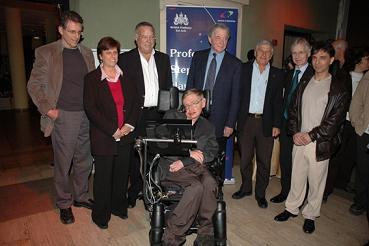Netzer said the words at a reception in honor of Prof. Stephen Hawking that took place on Tuesday at Tel Aviv University

Group photo with Prof. Stephen Hawking: from right to left: Prof. Yaron Oz, Head of the School of Physics and Astronomy; Tom Phillips, British Ambassador to Israel; Prof. Danny Levitan, rector of the university; Prof. Itamar Rabinowitz, president of the university; Prof. Stephen Hawking, University of Cambridge (middle of photo); Dov Lautman, Chairman of the Executive Committee; Prof. Hagit Messer Yaron, Vice President for Research; Prof. Avhram Nitzan, director of the Sackler Institute for Advanced Studies. Photography: Michal Rosh - Ben Ami, Tel Aviv University photography unit.
"Israel must join one of the largest telescope projects in the world, so that it can maintain the scientific level of its researchers at the forefront of research. This is what Prof. Hagai Netzer, from the Department of Astrophysics at Tel Aviv University, asked in his lecture during the reception held by the university management and the faculty for Prof. Stephen Hawking on Tuesday. (some details of the event were reported yesterday). Prof. Netzer wishes to include this requirement in the University's New Horizons in Science project.
"We must remember that to do astronomy you need the right equipment, ie ground and space telescopes. We are working to purchase observation time for Israel with a large telescope. This is because in the state of research today, if we do not have large telescopes we will not be able to contribute in the field of astronomy. "
"We raised the issue for the first time in 2001, a year later a committee visited us and decided that the requirement was essential. A few months ago, Tel Aviv University announced that it would raise funds to bring Israel into the project, but this is only an initial budget and additional amounts and the participation of other parties are needed to bring us to one of the telescopes."
Prof. Netzer listed three international projects from which to choose:
* The GTC telescope in the Canary Islands - Spain - is about to start operating in the coming months.
* The giant telescope being built in South Africa whose mirror diameter is 10 meters.
* The third option - the most expensive - is to join the European Southern Observatory (ESO) project in Chile, in which about a dozen countries from Europe are already members.
"Tel Aviv University, in collaboration with other institutions in Israel, announces its intention to join a large international observatory in order to allow scientists to take part in advanced astronomical research that includes, among other things, the study of the most ancient galaxies, giant black holes, the dark matter in the universe, near and far super novae, planets Near distant stars and more."
"New horizons in astronomy concern not only the most advanced measuring instruments, and the fundamental questions of nature, but also the relationship between advanced scientific research and the general public, especially the youth, because of the enormous interest aroused by astronomical topics and news from this field and the possibility of bringing tomorrow's researchers closer to today's universities Prof. Netzer noted.
Prof. Yaron Oz, Head of the School of Physics and Astronomy, reviewed the challenges in physics starting from basic questions about the formation of the universe, dark matter, dark energy, quantum theory and string theory to possible applications of quantum computers and conductors.
Prof. Michael Kozlov presented the Ofakim New Horizons project of Tel Aviv University in the field of biophysics. According to him, the branch of biological physics deals with understanding the basic physical principles of biological processes. At Tel Aviv University, great emphasis is placed on understanding the physical forces that determine the behavior of important biological molecules such as DNA, proteins and lipids. At the university, interactions between these molecules and their dynamics are studied in order to decipher the mechanisms of action of the living cell in healthy and diseased states. The results of this basic research are expected to have important implications for biotechnological applications, drug development and medical research. "New directions in research at the university will be dedicated to opening new experiments on individual biological molecules and the protein structure of the cell membrane," added Prof. Kozlov.
